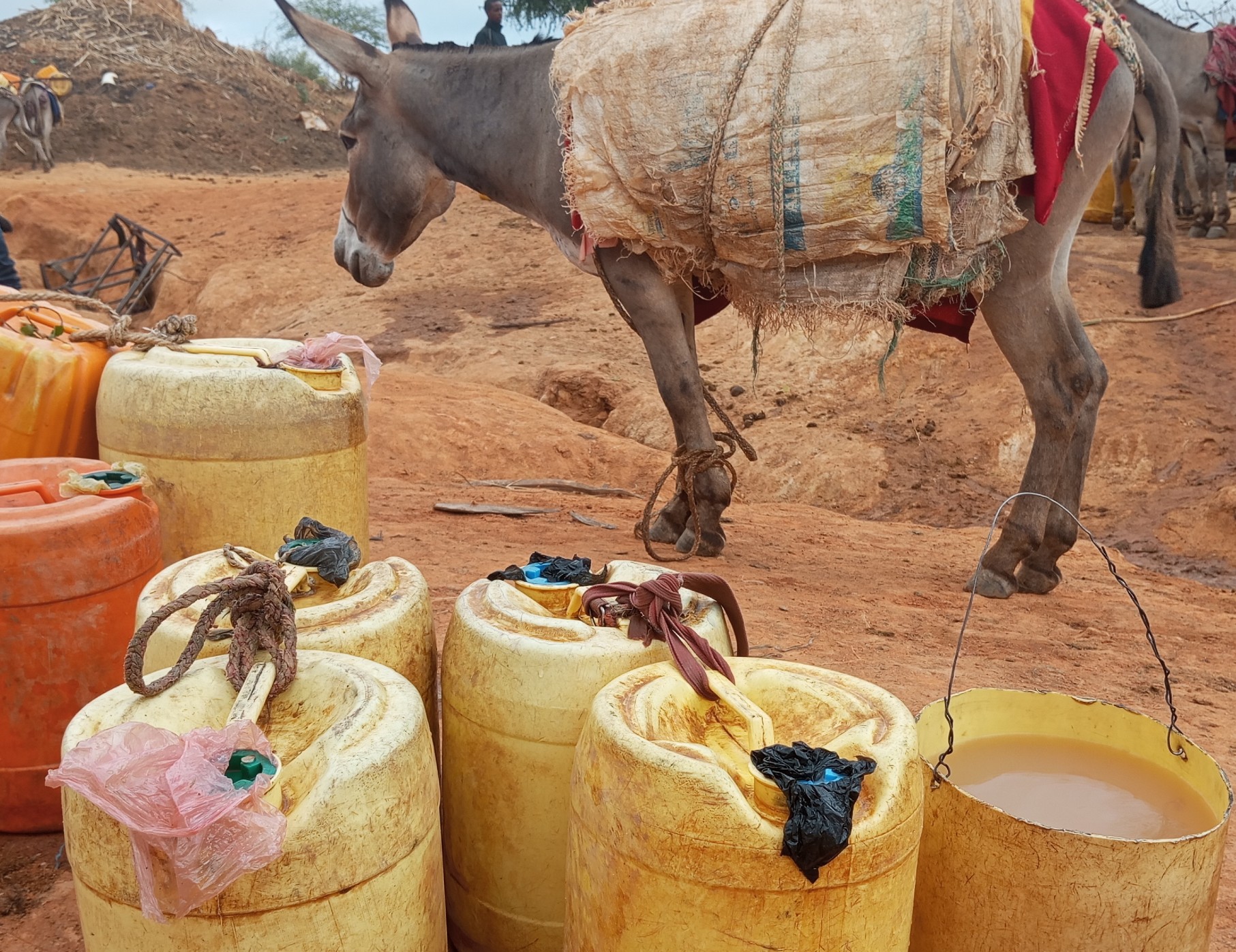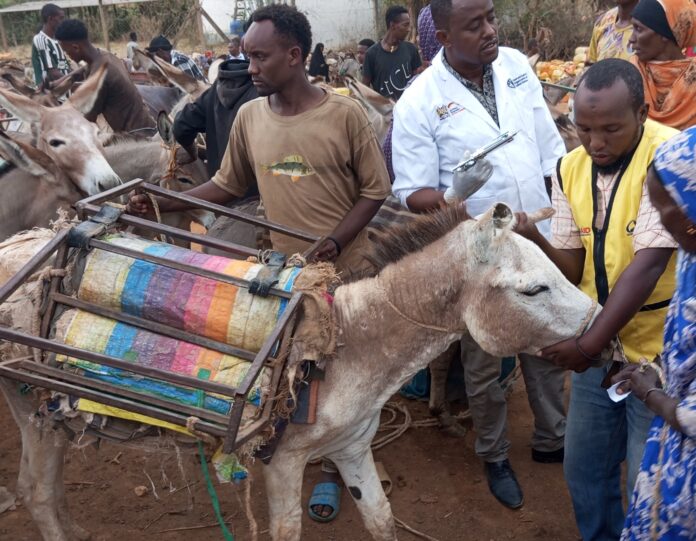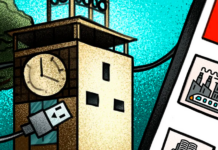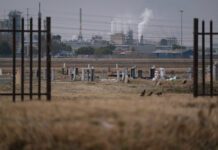By Lenah Bosibori
Marsabit County, Kenya: It is early morning around 6 am, and a group of agriculture journalists from Nairobi who had traveled for 772 kilometers settled at Heilu Manyatta ward for a donkey vaccination exercise that was scheduled to take place.
At Heilu ward, the sound of braying donkeys and jerricans bumping into each other welcomes us at Heilu dam in Moyale sub-county Marsabit county, northern Kenya. As I followed the noise, out of curiosity, the writer followed the lead to find out their destination, only to realize that the domestic animals were headed to a nearby water point at Heilu, Manyatta ward.
At the dam’s entry, security guards tell me that everybody is required to pay five Kenyan shillings for a 20-liter jerry can for locals and 10 Kenyan shillings for Ethiopians, the buyers later sell the water in Moyale town at 100 Kenya shillings per 20 litre jerrican.
Out of curiosity, I peeped inside the dam to see how locals are fetching the water, and to my shock, the water quality is so poor and not fit for human consumption as illustrated in the picture below.

Fatuma Dalle, a villager tells the writer that the water is dirty and not safe for human consumption but they have no choice, she adds that it even gets worse if one does not have a donkey to use for carrying that dirty water.
“I have come here with my two donkeys that help me in the water supply business. I distribute the water I fetch from the dam daily to people living in Moyale town who are inaccessible to the basic commodity,” Ms. Dalle, a Heilu resident says.
Dalle, a 42-year-old mother of six, who faces a language barrier is assisted by a middle-aged man who translates my concerns for her into the understandable Borana dialect.
Due to a lack of water storage materials, local residents and those from neighboring Ethiopia depend on the rainwater collected at the dam which they also share with wild animals but say that when the wild animals get in touch with the water they term it dirty and not safe for human consumption.
“Before the dam was built, we used to trek for over five kilometers to look for water but since the dam was established through efforts of community members around Heilu ward, we have been relieved from the burden of walking for long distances. We water vendors have taken the initiative of employing two security guards to watch over the water from being contaminated by wild animals,” she explains.
The water business is booming in this area as the vendors buy a 20-litre jerry can for five shillings and sell it for 100 shillings in the town.
Heilu Water Point is strategically located at the boundary of Kenya and Ethiopia, acting as a meeting point for neighboring communities.
“Foreigners from Ethiopia and people from other wards pay 10 shillings more than Heilu residents for a jerrican of water,” she says.
Dalle says that it is through the business that she gets to fend for her family and even pay school fees for her six children.
She is hopeful that with time she will manage to buy more donkeys and expand her business. Manyatta ward has around 2,000 occupants who depend on water from the reservoir.
Heilu Manyatta Ward is a central point for donkey vaccination
On this particular day, a team from Africa Network for Animal Welfare (ANAW) in partnership with the County government of Marsabit in Moyale Sub County partnered to vaccinate donkeys in Heilu and Banisa wards, targeting the dam site because of its central point for the beasts of burden.
Walking along the water point, this writer meets Abdi Dida who was lining up his yellow jerry cans for water before heading to prepare his donkey for the vaccination but was kind enough to stop and explain how he takes care of the domestic animal.
“I employ Ethiopians to take care of my donkeys because they come from the neighboring country, an employee reports to work in the morning and returns home in the evening,” Dida narrates.
“They are paid a monthly salary of Ksh. 2,000 to Ksh. 3,000 depending on the number of donkeys the employer has in his stable,”.
Dida,48, says that most of them seek Ethiopians to enable them to engage in other activities and their children to go to schools without being troubled by having to graze their cattle.
There are Kenyan markets where the pastoralist communities buy the animals but still, because of proximity, some still prefer to buy donkeys from Ethiopia.
“We share one market with the Ethiopians so in case one wants to buy a donkey it is never a problem. There are Kenyan men there who help with negotiation and even act as witnesses during the purchasing process,” Dida explains.
He says that the witnesses help in authenticating the transaction and help identify the donkey in case it retrieves its movements back to the seller’s home.
Dida who has been in the business for more than 20 years mentions that one of the major challenges that the community faces is the inability to identify their donkeys in a herd when they get lost.
“We still lack proper means of identifying donkeys; we simply observe the direction from where the animal is coming from to tell if it is from Manyatta or Ethiopia. Ethiopian donkeys have dark body marks while with us we tattoo the ears or use physical marks which at times resemble,” he implies.
He adds that another challenge is the disappearance of the animals and the owners only embark on a two-month search mission before giving up.
On this particular day, veterinarians from the African Network of Animal Welfare(ANAW) in collaboration with the county government of Marsabit visited the villagers to empower them on how to enhance donkey security and conduct mass vaccination against rabies, and tetanus among other common conditions specifically at Heilu and Ginisa regions.
Inter-county transfer of donkeys a threat to the animals
“This village was one of the areas highly affected when we had conducted operations on slaughterhouses in the country. As a result of illegal movements of the animals between the two countries, quite several donkeys were affected and hence stolen,” Doctor Dennis Bahati, a Programs Manager from ANAW explains.
At the water point, we move closer to watch from a distance how the vaccination is being administered but acutely aware of the hostile nature of the animal.














